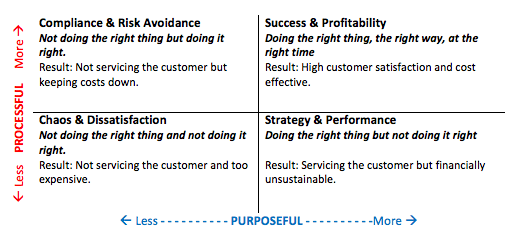governance
Are you ‘Processful’ or ‘Purposeful’ – A Governance Dilemma
Published: December 16, 2018
Read Time: 5 minutes

I recently went overseas to a country that I knew would challenge me in many ways… an experience I relished. I enjoyed what the country had to offer in attractions and experiences, and observed a growing economy striving to adopt as much western culture as possible. This seemed impressive on the surface, however, the more I got curious the more I noticed the ‘busyness’ of the people: they were busy trying to be efficient but, were failing to be effective. They were focused on the process and not the purpose.
I was intrigued at how busy some people could be doing their job whilst ignoring co-workers and customers. They were people working long hours on multiple tasks with tight deadlines and who received little appreciation or feedback from their leaders for the personal sacrifice being made.
I wondered why their leadership had not recognised what was happening. Surely the results they were getting, or more specifically not getting, were indicators of failed effectiveness. It demonstrated to me that investing in being efficient does not automatically mean you’re getting results or delivering the services and/or products wanted by your customers.
So why were these leaders and teams not connecting to their purpose? The answer was simple; it’s a matter of where you choose to focus. If what you focus on is what you get, these employees were more interested in getting the ‘process’ right than delivering on ‘why’ they were there in the first place.
Doing Things Right is of No Value if You’re Not Doing the Right Thing(s)
In broad terms, ‘doing the right thing’ is derived from the strategic role the board plays in governing the business, and likewise ‘doing the thing right’ is the operational role of the executive and management team. These are not the only roles, however, a key governance dilemma for the board is getting the balance right. How much does the board plan and monitor and how much does it need to oversee and delegate to management to get right? It also needs to ensure it is ‘doing the thing right’ – the thing of governing. This is where the monitoring role of the board is critical – monitoring the business and monitoring itself. For example, if a board’s focus is predominantly on Compliance and Risk Avoidance, it is prone to neglect its customer or client base, leading to customer dissatisfaction. It may very well keep costs down, but this is likely to come at the expense of failing to deliver on its mission. Similarly, if the board focuses too much on Strategy and Performance, they may very well achieve their goals and achieve true customer satisfaction, however, they also run the real risk of insolvency.
More significantly, the board faces real concerns if it does not focus on any of these four key governance elements and gets too involved in the operational aspects of the business. It risks becoming irrelevant, the business falling into Chaos & Dissatisfaction, it fails on its mission and risks significant financial collapse and reputational damage. Ultimately, the goal is to be in the best position possible, the Successful and Profitable quadrant. This involves doing both servicing the customer, achieving high satisfaction rates, and being cost-efficient and effective.

When we consider the role of the board, it is primarily summed up in terms of the above: Strategy, Performance, Compliance and Risk Avoidance. The dilemma for the board is getting the balance right to ensure the business is both processful and purposeful…and in doing so being timely in its application.
Being Purposeful
In short, to be purposeful, the board must ensure it has the right people around it. Get the best people in the boardroom and inside the business. Practically, the board papers must focus on purpose and how every decision impacts on those objectives. Directors must be encouraged to ask questions, remain flexible to the environment, and be skilled and courageous enough to have the difficult conversations. Directors must make challenging decisions based on clear information and not delve into operational matters unless the organisation is in crisis.
Being Processful
Boards, directors and management teams must have clear and concise information delivered by appropriate systems and processes. The board needs to critically analyse what information it needs, when it needs it and how it should be presented. It is equally important to measure performance and respond. A process of receiving and delivering valuable feedback to leaders (including the board) on their effectiveness is essential, as is acting on those findings.
So, if your board is on the governance treadmill, running in circles to be processful; doing things right – then you may need to stop, step off and ask yourself: Are we being purposeful? Are we doing the right things? It is when you connect with your purpose that you will lead from a place of clarity and authenticity. The results will be significant, you will inspire your customers and engage with those you lead to keep them busy and productive doing the right things, the right way and at the right time – to get real results.
This article was originally published in the Better Boards Conference Magazine 2018.
Share this Article
Recommended Reading
Recommended Viewing
Author
-
Executive Coach
Turner Scott Consulting
- About
-
Chris is an inspirational, results-oriented business development leader specializing in organizational alignment to strategic intent. His commitment is to inspire good governance leadership and executive team performance to ensure results-oriented business outcomes. Chris is passionate about empowering organizations to reach their potential. Working with and guiding board directors, executives and senior leaders within an organization to create exceptional success. He firmly believes that the path to business success is the empowerment of people over the exertion power … great leaders inspire leadership qualities in others’ capability to lead.
Found this article useful or informative?
Join 5,000+ not-for-profit & for-purpose directors receiving the latest insights on governance and leadership.
Receive a free e-book on improving your board decisions when you subscribe.
Unsubscribe anytime. We care about your privacy - read our Privacy Policy .










